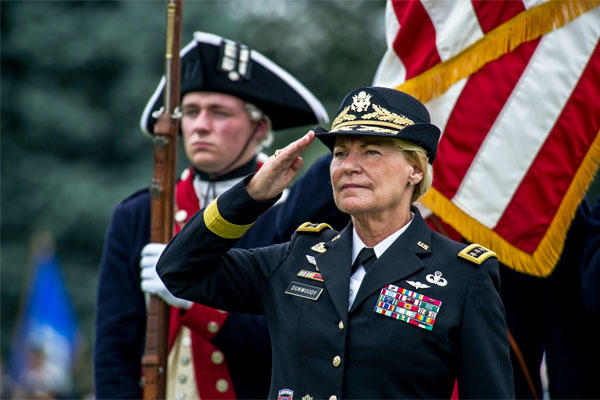To service members, military protocols, procedures and customs are second nature. They fall in line and forget their spouses may have no idea what's going on. And when you're attending a ceremony or event and have a question, it's often too late to ask it.
You probably can rely on your good sense to get you through any awkward conversations or situations, but you'll feel much better heading into an event if you know what's expected. First of all, there are no military regulations that dictate how you, a civilian, should act. But there will be some expectation that you know what's going on -- most events have programs (yay!) -- and follow accordingly.
Whether you're a seasoned military spouse or a new one, this quick refresher will help you feel at ease with whatever events are on your calendar.
Military Balls
Military balls are one of the best military traditions, but they have more than their share of protocols to go with them. Luckily, most programs will indicate what you are to do, what you are to say and when you are to stand. And you always can find someone to follow if you're not quite sure. Read all about what to expect at a military ball here.
Parades and Ceremonies
If you like to attend ceremonies, you can keep a few things in mind to make sure you enjoy the event instead of stressing over it. When the flag passes by -- during a parade or ceremony -- stand, face the flag and put your right hand over your heart.
You show that same respect to the flag when the national anthem is played (yes, even before the movie starts in the movie theater). And depending on your installation, you may be expected to act when "Retreat" plays at the end of the day.
For Any Event
When receiving an invitation, you'll see the details of an event and whether an RSVP is requested. Please respond. There's nothing more frustrating than trying to guess how many people are attending.
Consult the invitation for information on the dress code, and if you have questions, ask the host. A good rule of thumb is to match your service member's formalness. If they are wearing their daily uniform, you can go business casual. If it's their uniform, dress it up a bit more.
Don't bring your children or other guests if they weren't included in the invitation. And always arrive on time.
Formal Dinners
While not quite as antiquated as the rest of the world may think, military formal dinners -- often called Dining Outs -- can be a lot of fun. But you'll want a quick refresher on the protocol.
Most of the time, you'll need to wait for the dining room to be opened officially. You may sneak in and put your purse down, but don't sit down immediately. Work your way in when using the silverware and, when in doubt, let someone else grab a water glass first so you know which one is yours.
And please, no matter how boring you find the speaker to be, don't go to the bar during the speech. In fact, they close those down most of the time during the speeches to prevent this.
Receiving Lines
Receiving lines can be a lot of fun and give your service member a chance to introduce you to the hosts of the event. This is not the time for long conversations, though; you're just passing through.
Your hands should be empty, so don't take any drinks with you or appetizer plates. Your service member will hand a calling card with your names on it or present you to the first person in line, who will pass your name to the next one. The first person in line is not part of the receiving line, so don't shake their hand.
Informal Occasions
Sometimes you will receive an invitation for an informal get-together. These are often the events because you can relax and really get to know someone. While not required, a gift for the host is encouraged, but keep it small and practical. Ideas could be a tea towel, a bottle of wine, cocktail napkins or even a box of stationery.
And yes, a thank-you note is appropriate and appreciated after attending an event at someone's home. Handwritten and popped in the mail is the best, but if not practical or you don't have the address, it's OK to send an email.
The bottom line on military events and protocol is to be respectful of tradition and the people around you. Ask if you have questions, but above all, have a good time.
Keep Up with the Ins and Outs of Military Life
For the latest military news and tips on military family benefits and more, subscribe to Military.com and have the information you need delivered directly to your inbox.





























